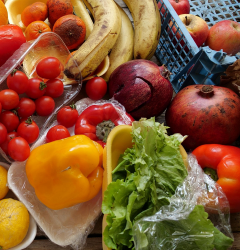04 Jul

The Growing Concern: Grocery Store Waste
Today, the issue of grocery store waste is growing at an alarming rate. According to the Food and Agriculture Organization of the United Nations, one-third of the food produced for human consumption globally is lost or wasted. When we drill down to the specifics of food waste in grocery stores, the numbers become even more alarming. This issue is pressing, not just because of the monetary value attached to the wasted products, but also because of the significant environmental implications. This includes the wasted resources used in food production, packaging, and transportation, along with increased greenhouse gas emissions from food decomposition in landfills.
The AI Revolution: Technological Solution to a Persistent Problem
In the face of such immense challenges, the advent of Artificial Intelligence (AI) in the retail sector shines like a beacon of hope. Advanced predictive algorithms can optimize inventory management, reduce overstocking, and therefore, minimize food waste. AI’s ability to learn from large volumes of data, identify patterns, and make accurate predictions is game-changing. But how exactly does this work in the context of food waste in supermarkets?
AI and Inventory Management: A Smarter Way to Stock
AI technologies are primarily utilized in retail for predicting customer behavior, enhancing the customer experience, and optimizing inventory – the latter playing a critical role in minimizing food waste. AI-powered inventory management systems can forecast the demand for different products accurately. This predictive ability is based on various factors, including historical sales data, customer buying patterns, promotions, seasonality, local events, and even weather patterns. This level of granular forecasting helps supermarkets order and stock precisely what they need, reducing overstock and consequently, waste.
AI and Dynamic Pricing: The Win-Win Solution
Another revolutionary AI application in retail is dynamic pricing. AI can adjust the prices of items dynamically based on factors like demand, shelf-life, and time of day. For instance, products nearing their sell-by date can be automatically discounted, encouraging customers to buy these items before they expire. This strategy is a win-win solution. It reduces food waste and provides customers with discounted products while also allowing the supermarket to recoup some of the costs of items that otherwise would have been wasted.
AI and Food Waste: The Broader Implications
The benefits of using AI in managing food waste extend far beyond the confines of a single grocery store or supermarket. Wider implementation of AI-driven solutions can significantly contribute to global sustainability goals. As we face the ongoing threat of climate change, reducing food waste becomes not just an ethical necessity but also an environmental imperative. Furthermore, in a world where millions still suffer from food insecurity, using AI to manage food waste could also contribute to a more equitable distribution of food resources. Redirecting food that would otherwise be wasted to those in need can help alleviate hunger in our communities.
The Future of Retail: Harnessing AI’s Potential
The potential of AI in retail waste management is immense. As we look to the future, it’s clear that we must make smarter use of our resources and technologies to build a more sustainable world. While AI is not a magic bullet that can solve the food waste problem overnight, it’s a powerful tool that can significantly contribute to the solution. The more we can learn and adapt these technologies to our needs, the closer we get to a future where grocery store waste is significantly reduced, and sustainability becomes the norm rather than the exception.
Embracing AI in Retail
Embracing AI’s potential in retail waste management is not just about adopting new technology; it’s about shifting mindsets, redesigning processes, and committing to sustainability on all levels. Retailers, technology developers, policymakers, and consumers all have a part to play in this journey. Together, we can drive the change needed to reduce our environmental footprint and build a more sustainable future.
Developing AI-Powered Solutions: The Road Ahead
The road to fully unleashing the potential of AI in retail waste management will undoubtedly be a journey of continuous learning and innovation. Technology developers need to continue refining AI algorithms for improved accuracy and developing user-friendly interfaces that make these powerful tools accessible to all types of retailers. Retailers, on their part, need to be willing to embrace change. They need to invest in these AI-powered solutions, integrate them into their operations, and train their staff to use them. This requires a commitment to ongoing learning and an openness to continually adapting business practices in response to new insights gained from these AI tools.
Policy and Regulation: The Role of Governance
Policymakers also have a crucial role to play in this journey. Regulatory frameworks need to be developed that encourage the adoption of AI technologies in waste management, possibly through incentives or subsidies. Policies should also aim to foster a culture of sustainability among consumers, such as initiatives that raise awareness about food waste or programs that encourage the purchase of discounted items nearing their sell-by date.
Consumer Engagement: An Essential Element
Lastly, consumers have a significant part to play in this change. Consumer behavior heavily influences retail operations, and ultimately, the amount of waste produced. As AI technologies make it easier for stores to reduce waste, consumers can support these efforts by adjusting their shopping habits. This can be as simple as choosing to buy discounted items that are near their sell-by date or supporting stores that are actively trying to reduce waste.
Wrapping Up: A Collective Endeavor
Unleashing the full potential of AI in retail waste management is a collective endeavor. It requires the combined efforts of multiple stakeholders, each playing their part in embracing these innovative solutions. But the rewards of these efforts – reduced waste, improved sustainability, and a healthier planet – are well worth it. In the face of the pressing issue of food waste, the potential of AI shines through as an innovative and practical solution. As we look to the future, it is clear that the integration of AI technologies into retail operations is not just a passing trend, but a critical step towards a more sustainable and efficient retail sector. The promise of AI in reducing food waste is immense and is an opportunity we must seize to build a more sustainable future.
Related Post
Tags
Keywords
Tags
Resources
© 2020-2024 Link Retail. All rights reserved.











